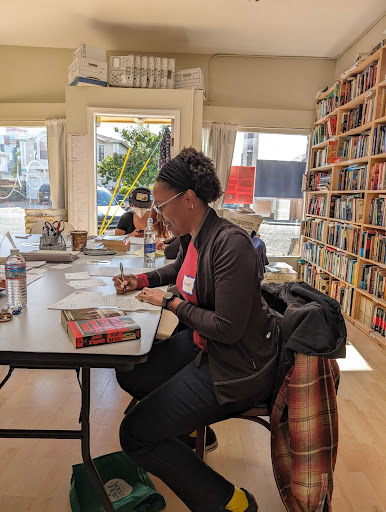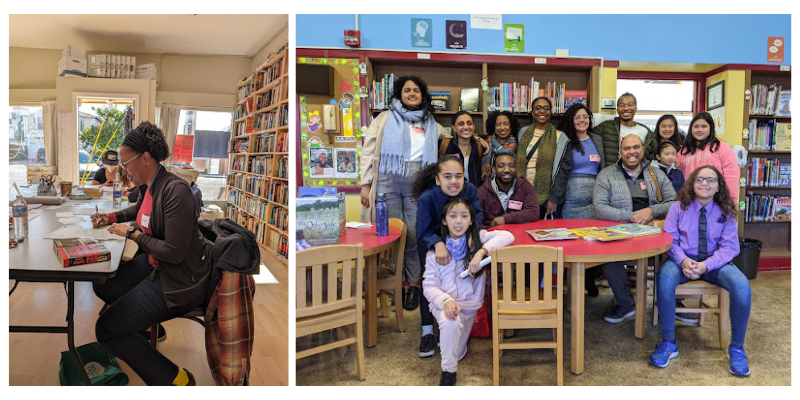PFS Staff Spotlight: Tiffany Wood

10 Questions for Tiffany Wood, Senior Program Officer at Pacific Foundation Services
- You’re a Senior Program Officer at Pacific Foundation Services. What inspired you to get into philanthropy?
Prior to my philanthropic journey, I conducted education policy research that often included asking school teachers and school administrators to take surveys and allow my team to observe their classrooms to ultimately inform policy. However, the reports we’d write up were often misconstrued by the policymakers themselves or didn’t achieve the impact our team had hoped for. After a few years, I felt a desire to pivot and try something that’s closer to the ground. That’s when I, serendipitously, got an email about the Multicultural Fellowship Program at the San Francisco Foundation that creates space for mid-career professionals to get exposure to the nonprofit sector, nonprofit leadership, and philanthropy. I was lucky enough to be accepted into the program. So that’s how I kind of stumbled into philanthropy.
During my time at the San Francisco Foundation, I was exposed to grantmaking to education nonprofits, met several on-the-ground leaders in the philanthropic sector, and I was hooked. It was very different from working on the nonprofit side, where you’re constantly fundraising. I was able to meet lots of folks in the community, figure out ways to advocate for them, and help them access much-needed resources.
- Is there a topic or trend in philanthropy that is top of mind for you?
As of late, I’ve thought a lot about foundation spending. First of all, many foundations don’t have the best history as a lot of their assets were collected on the backs of the poor, of folks of color, slaves, and by taking advantage of marginalized populations. I feel that philanthropy owes a huge debt to society, and relinquishing power and control over money seems to be as hard for foundations as it is for corporations.
I continue to see many foundations holding hard and fast to the 5 percent giving rule, and I find myself asking: ‘How can we encourage and influence foundation boards to give larger grants with fewer restrictions?’ In my opinion, there doesn’t have to be as much red tape in philanthropy. A lot of the same calls to philanthropy when I started in 2006 are still being made today; give larger grants, increase multi-year funding, decrease restricted funding, etc. – it’s a broken record. What the philanthropic sector now calls ‘trust-based philanthropy’ used to be called ‘Project Streamline,’ and it will likely be called something else 10 years from now. But, why is philanthropy so resistant to change or to being more generous? When it seems like the world around us is falling apart…the opportunity to step up is here and now. Until philanthropy is willing to do more and be more, we won’t get to the root of many of the problems that foundations claim to be trying to solve.
- How does equity show up in your work at PFS?
Equity shows up in who has a voice at the table, who reaps benefits, who gets second chances, and the like – both internally across our different teams and departments at PFS and with our clients. Our DEI Team, Management Team, and staff work internally on these issues to move continuously toward a more equitable work environment. Equity also shows up in how PFS staff advocate to make sure the voices and priorities of the nonprofits we fund don’t get lost in the grantmaking process. For example, sometimes our client foundations like to conduct meetings at a nonprofit space. But as a team lead, I get to question whether the benefit of having our meeting at a nonprofit space outweighs the burden that will be placed on the nonprofit by hosting us. Will the foundation board actually have time during this meeting to engage with the nonprofit? Does the nonprofit need their space more than we do? In my role, I’m able to make sure we’re not asking for too much or asking in an inequitable fashion. If we do use a nonprofit’s space or ask a nonprofit leader to come in and speak at a board meeting, we make sure to provide an honorarium to offset the burden.
- In the Bay Area, the region is changing rapidly in both positive and challenging ways. As you consider the changes, what is your greatest hope for the Bay Area?
I would say one of my greatest hopes would be more collaboration across sectors and communities. The #MeToo movement, the George Floyd incident, and other forms of violence against Black, Brown, and other marginalized communities have brought groups that typically weren’t in conversation into conversation and into community with one another. On the other hand, this also has drummed up radical extremism in some scary ways, but my hope is that we will continue to talk across cultural, racial, and other divided lines to become more unified toward a goal of living better together.
I’m a Georgia girl from the South, and I’ve had my own bouts with racism. So, I definitely don’t have a pie in the sky orientation, and, yes, I can be a bit of a pessimist. But, I feel like there are definitely ways that we can live better together, so that gives me a bit of hope.
- How has your work changed your outlook?
I told you, I’m a pessimist. 🙂 I feel like rich entitled people can often exhibit rich and entitled behaviors, even when their hearts are in the right place. And when they feel that their hearts are in the right place, sometimes it’s hard to get anyone to speak truth to their power. However, there are lots of folks with wealth, even some who are entitled, who are doing a lot to try to make the world a better place. There’s quite a bit of room and opportunity for people like myself and many of my colleagues, who want the best for disenfranchised folks, to work from within to get more money to the communities that need it most – regardless of donor intent or level of understanding of equitable philanthropic practices.
- Our world has benefitted from the leadership of so many change-makers, past and present. Who do you especially admire?
The first person that comes to mind for me is Lateefah Simon. I met her early on in my journey in philanthropy in San Francisco when she was working for DA Kamala Harris.
Her story of perseverance is amazing, and she is a true agent of change! As a single mom, she earned a college degree, and, at 19 years old, led the Center for Young Women’s Development (now the Young Women’s Freedom Center). Soon after, she earned a MacArthur Genius Award in recognition of her work there. More recently, Lateefah was the president of the Akonadi Foundation and is now running for Congress. Her story is inspirational, and if you meet her, you will be changed by her energy. She is powerful, brilliant, a lover of community, a fierce advocate for equity and justice, all while remaining very humble.
- Which PFS organizational value would you say shows up in your day to day work the most? (generosity, respect, integrity, inclusion, commitment, humility).
I would say it’s hard to pick from these, because PFS hires people who inherently exhibit these values and the values are often intertwined, but if I had to choose one, I’d say inclusion. I’m constantly paying attention to who has a voice and who is or is not invited to give their input and opinions. This is true in my work with the nonprofits we fund and internally with my colleagues.
At PFS, I’m part of the DEI team. This work has led me to pay attention and notice how, in certain conversations or situations, I can leverage my own power to create space for other people to come to the table. I’m an introvert who pays attention to the details, and that orientation makes me hyperaware of those who are quiet or ‘unheard’ in the room and to help figure out ways to invite them in. Inclusion work is about listening to and seeing people, which I try to do as best I can.
- What’s something unexpected that you like to do outside of work?
I’ve already shared how I can use philanthropy to move assets to those with less, and I also like to do the same thing outside of work. I follow apps like Nextdoor and BuyNothing to gather items that people are giving away for free to repurpose for myself or to support others. For example, I volunteer at Prisoners Literature Project (PLP) that helps inmates across the country get access to books, learning materials, and other educational resources, and I’m constantly looking for free books. One time, I secured five bags of paperback romance novels in great condition that someone was giving away, and romance novels are in high demand at PLP! My colleagues at PFS have also donated some great books that I have been able to match with many of the people who request books from PLP. Incarcerated folks are often overlooked, unseen, and unheard, so I truly value my time at PLP and the greater awareness I gain there.
In addition to volunteer work, I’m a creative at heart and enjoy sewing, knitting, painting – really anything where I can use my hands. I also enjoy gardening, and my house is a proverbial jungle. I’m always propagating my plants, and sometimes I give those away for free via the platforms I mentioned earlier.
- As you look to the future, what issue in our society feels especially urgent?
I live in Oakland, and I often think about housing stability and mental health in my community. It’s a complex issue; there just isn’t enough housing available, there are lots of folks on the street who need help, and there doesn’t seem to be enough political will to accomplish all the things that need to be done in Oakland. And I know it’s not just Oakland; it’s pretty much everywhere at this point. It’s hard and a mammoth problem, and the solutions are going to require generosity, kindness, money, creativity, and compromise.
- And lastly, what are you reading or listening to?
Over the last few months, I have listened to “Radical Candor,” a podcast and a book by Kim Scott. It focuses on giving and receiving feedback in ways that are authentic and built on trust. It dives into things like how to give critical feedback, especially when it’s going to be beneficial to someone in the long run. This skill set requires you to first build trust and community in the workplace to be able to effectively give and receive feedback and to actualize radical candor. It’s a topic we’ve been talking a lot about with the DEI team, and PFS has been working on building a stronger culture of feedback.

Contact us to discover how we can tailor our services and handpick a team of professional experts to support the specific needs of your foundation.